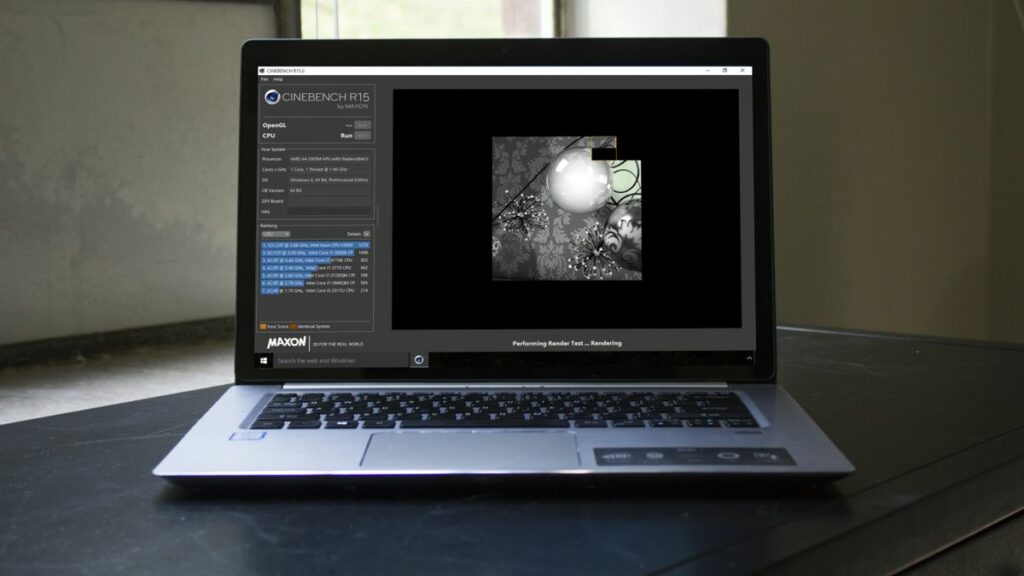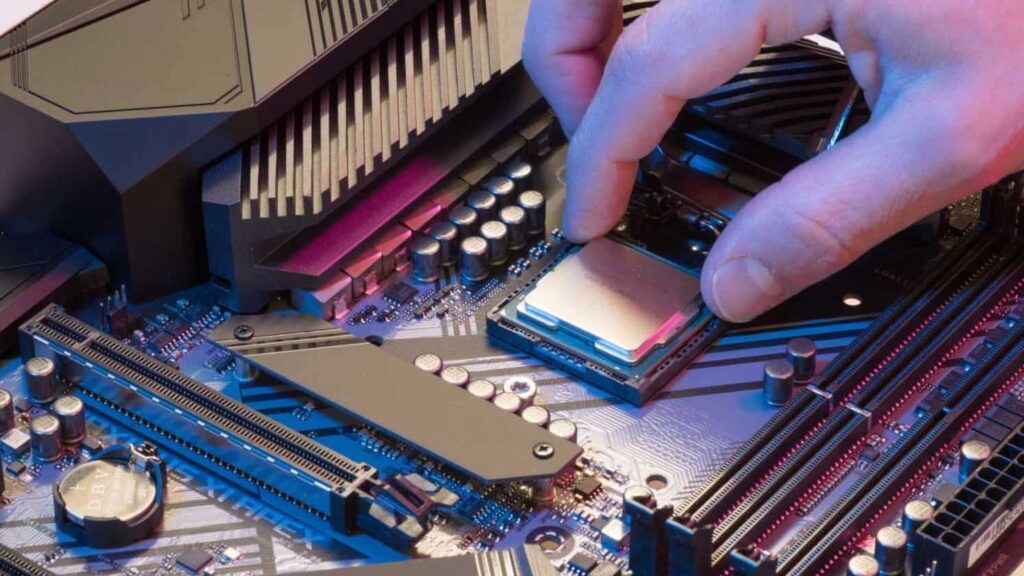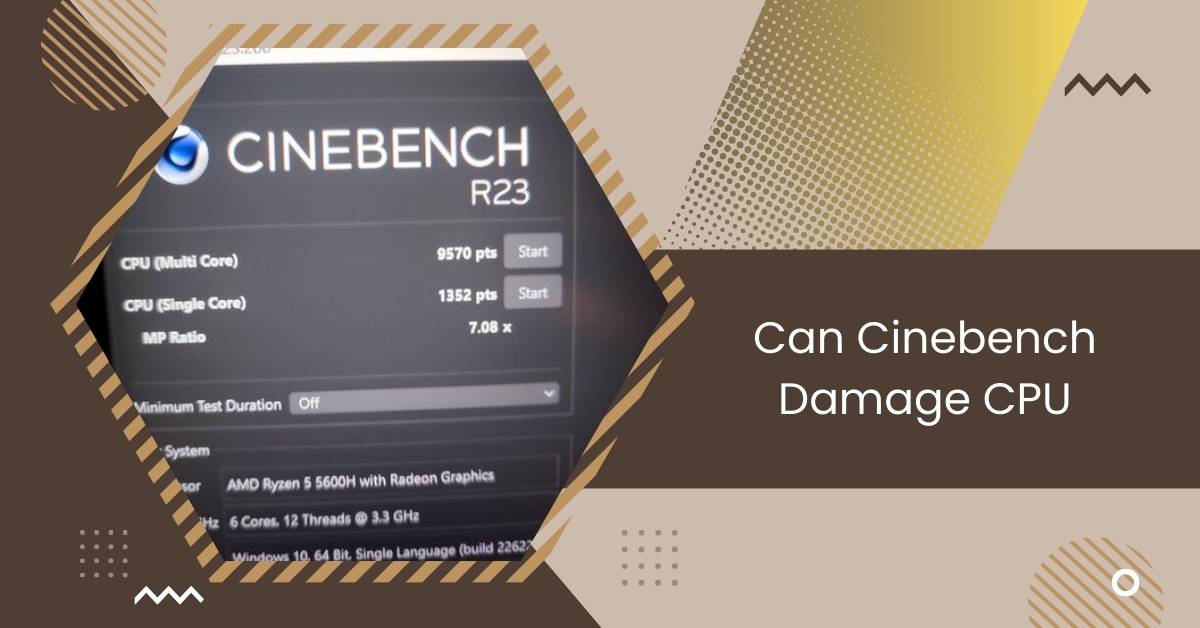In the realm of computer performance testing, Cinebench has emerged as a popular tool among enthusiasts and professionals alike.
No, Cinebench typically won’t damage CPUs. While prolonged high temperatures could harm the CPU, Cinebench tests are usually mild and safe, especially at stock settings.
In this article, we delve into the intricacies of Cinebench and explore whether it poses any risks to the CPU.
What Is CPU Overclocking?
1. Definition And Purpose
CPU stress testing involves checking how well your computer’s brain, the CPU, can handle heavy work. Tools like Cinebench help with this.
They put much pressure on the CPU to see if it can handle it. The purpose is to make sure your computer works well under tough conditions.
2. Risks Involved
Using tools like Cinebench can sometimes cause problems if not used carefully. They make your CPU work very hard, which can lead to overheating.
If your CPU gets too hot, it can damage the computer. So, watching out for this and monitoring the temperature is important.
Purpose Of Cinebench Stress Testing

1. Evaluating Cpu Performance
When we evaluate CPU performance, we’re checking how fast and well it can do tasks. Tools like Cinebench help us see this. They run tests to measure the CPU’s speed and power.
2. Testing System Stability
System stability means how well your computer can handle different tasks without crashing. Stress tests like Cinebench help check this. They push your computer to its limits to see if it stays stable.
3. Benchmarking Hardware
Benchmarking hardware means comparing different computer parts to see which is better. Tools like Cinebench help with this. They give scores to other parts, like the CPU, to see which is faster.
4. Assessing Overclocking Stability
Overclocking means making your CPU work faster than usual. But this can sometimes make it unstable. Stress tests like Cinebench help see if your CPU stays stable even when overclocked.
5. Identifying Hardware Issues
Sometimes, parts of your computer don’t need to be fixed. Stress tests like Cinebench can help find these issues. They push your computer hard to see if anything goes wrong.
6. Validating Cooling Solutions
Cooling solutions keep your computer from getting too hot. Stress tests like Cinebench can see if your cooling system works well. They check if your computer stays cool under pressure.
See Also: Is 70 Celsius Hot For CPU – Explore CPU Temperature Risks!
7. Ensuring Reliability
Reliability means how much you can trust your computer to work well. Stress tests like Cinebench help check this. They push your computer hard to see if it stays reliable.
8. Optimizing System Configuration
System configuration means setting up your computer to work its best. Stress tests like Cinebench help with this. They show if changes you make to your computer settings help it run faster and better.
How Cinebench Works

1. Overview
Cinebench is a tool used to test computer performance. It checks how well the CPU and sometimes the GPU work.
2. Rendering Benchmark
Cinebench creates images to test your computer. It measures how fast it can make these images, showing its rendering power.
3. Multi-Core Performance
Modern CPUs have many cores. Cinebench checks how well all these cores work together to do tasks quickly.
4. Cpu Utilization
Cinebench pushes the CPU to its limits. This helps see how much of the CPU’s power your computer can use.
5. Realistic Workloads
Cinebench uses tasks like those in real life. This helps see how well your computer handles everyday work.
6. Scoring System
Cinebench gives scores based on performance. Higher scores mean better performance, making it easy to compare different computers.
See Also: CPU Vdd Soc Current Optimization – Optimize CPU Power!
7. Graphics Benchmark (Optional)
Cinebench can also test the GPU. This helps see how well your computer handles graphics tasks.
8. Cross-Platform Compatibility
Cinebench works on different types of computers. This makes it easy to compare performance between different brands.
9. Industry Standard
Many professionals use Cinebench. It’s a trusted tool for testing computer performance, making it an industry standard.
Can Cinebench Damage Cpu?
1. Exploring The Concerns
Some people worry that using stress tests like Cinebench might harm their computer. Let’s look at these concerns more closely.
2. Factors Influencing Potential Damage
Several things can affect whether stress testing could damage your computer. It’s essential to understand these factors to stay safe.
3. Heat Generation
When your computer works hard, it gets hot. Stress tests like Cinebench make it work even harder, which can lead to overheating.
4. Overclocking
Overclocking means making your computer work faster than usual. While it can boost performance, it also increases the risk of damage during stress testing.
See Also: ROG Live Service High CPU – Must You Need To Know – 2024!
5. Voltage Spikes
Voltage spikes happen when the amount of electricity going to your computer suddenly increases. This can damage the components, especially during stress testing.
Risks And Considerations

1. Heat Generation
When your computer works hard, it produces heat. Stress tests like Cinebench make it work even harder, which can cause overheating.
2. Potential Damage
Using stress tests like Cinebench can sometimes lead to damage if not used carefully. Overheating and overworking components can cause harm.
3. System Stability
Stress tests check how stable your computer is under pressure. They push it to its limits to see if it stays reliable.
See Also: CPU Caterr Detected – Solve CPU Catering Detected Error ASAP
Best Practices
1. Temperature Monitoring
Keeping an eye on your computer’s temperature is crucial, especially during stress tests like Cinebench. Monitoring helps ensure your system stays within safe temperature limits to prevent overheating.
2. Cooling Solutions
Effective cooling solutions are essential for maintaining optimal temperatures during stress testing. Proper airflow, CPU coolers and adequate ventilation help dissipate heat and prevent components from overheating.
3. Testing Duration
The duration of stress testing sessions, such as those with Cinebench, can impact your system’s overall performance and stability assessment. Longer testing periods provide more comprehensive data for evaluation and ensure consistent results.
Are Stress Tests (Like Cinebench) Harmful If Done Too Much?
Stress tests such as Cinebench can potentially be harmful if done excessively. While they are useful for evaluating system performance, subjecting your computer to prolonged stress can increase the risk of damage.
Over time, excessive stress testing may lead to accelerated wear and tear on components, especially the CPU.
It’s essential to strike a balance and avoid running stress tests excessively to ensure the longevity of your hardware.
How To Run Cinebench To Test Your PC?
- Download and install Cinebench from a trusted source.
- Open the Cinebench application on your PC.
- Select the CPU test option to evaluate your processor’s performance.
- Optionally, choose the GPU test to assess graphics performance as well.
- Click on the “Run” button to start the test.
- Wait for the test to complete, which may take a few minutes.
- Review the results provided by Cinebench, including scores and performance metrics.
- Consider repeating the test multiple times for accuracy and consistency.
- Monitor your PC’s temperature during the test to ensure it stays within safe limits.
- Use the results to compare your PC’s performance and identify potential issues.
See Also: AVConferenced CPU – Boost Your Conference Experience – 2024
Can I use Cinebench to benchmark my CPU and GPU?
Yes, Cinebench allows you to benchmark both your CPU and GPU. You can run tests for either or both components to evaluate their performance.
Does Cinebench support ARM processors?
Cinebench primarily focuses on x86 and x64 architectures, so it may not fully support ARM processors. However, you can check the latest version to see if it is compatible.
How long is a Cinebench test?
The duration of a Cinebench test depends on several factors, including your hardware specifications and the selected test parameters. Typically, tests can take a few minutes to complete.
Can the benchmark damage my CPU?

When used responsibly, Cinebench and similar benchmarks should not damage your CPU. However, prolonged stress testing or overclocking without proper cooling may pose risks.
Are Cinebench 2024 results comparable to scores from previous versions?
Cinebench strives to maintain consistency across versions, but improvements or changes may affect comparability. It’s essential to consider this when comparing scores across different versions.
See Also: Why Is My CPU Overclocking Itself – Stop CPU Overload!
Who is Cinebench intended for?
Cinebench caters to a wide audience, including hardware enthusiasts, professionals in the tech industry, and anyone interested in evaluating computer performance.
What are the minimal requirements for Cinebench 2024?
The minimal requirements for Cinebench 2024 may vary based on the operating system and specific features. However, you’ll typically need a compatible CPU and GPU and sufficient memory and storage space.
Final Thoughts
In summary, Cinebench is a valuable tool for testing CPU and GPU performance, typically safe when used responsibly. However, monitoring temperatures and avoiding excessive stress testing is crucial to prevent potential damage.
FAQs
1. How far from average are Cinebench R23 scores acceptable?
Acceptable deviation from average Cinebench R23 scores depends on hardware variations and environmental factors.
2. Can Cinebench damage my CPU
Cinebench won’t damage CPUs if used responsibly with proper cooling and within safe temperature limits.
3. Immediately after starting the Cinebench r23 I noticed that the temperature never dropped below 98-100°C (212F). 10 minute test. Could it have damaged the CPU (12700k)?
Sustained temperatures of 98-100°C during a 10-minute Cinebench R23 test can potentially damage the CPU, especially for a 12700k.
4. Cinebench damaged my CPU! (or MB)
If your CPU or motherboard is damaged after running Cinebench, it might indicate an issue with cooling or overclocking.
5. Is CinebenchR23 overly sensitive
Some users find Cinebench R23 sensitive to temperature spikes, especially with high-performance CPUs or inadequate cooling solutions.
6. 5600G reaches 95 degrees in Cinebench R23 with Wraith Stealth Cooler
A Ryzen 5600G reaching 95 degrees Cinebench R23 with a Wraith Stealth Cooler might indicate insufficient cooling or thermal paste application.
7. Did i damage my CPU or motherboard?
If your CPU or motherboard exhibits issues after running Cinebench, assessing cooling, overclocking, and stress test results is essential.
Also Read
- Env Node Bad CPU Type In Executable – Fix CPU Type Error!
- Why Is My CPU Not Being Utilized – Troubleshoot CPU Issues!
- Inventory Agent High CPU – Ultimate Guide In 2024!

Hi everyone, Johns Jack here, your approachable tech aficionado! I’m passionate about CPUs and thrive on keeping up with the newest tech developments. Join me as we delve into the dynamic realm of technology! Visit: Techy Impacts

